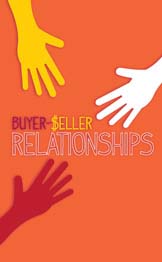INSIDER: Buyer/Seller Relationships
by Preston Sneed, MBA Candidate December 2009
How can the relationship between the buyer and seller prove to be more efficient? How can both parties benefit in the short-term and long-term from establishing a relationship? In "A Dialectical Model of Buyer-Seller Relationships" published in the Journal of Business and Industrial Marketing in 2009, authors Maud Dampérat and Alain Jolibert provide a framework for better understanding key characteristics of relationships in a business environment. The researchers show the need for sellers and buyers to be trained to maintain business relationships and emphasize certain determinants of buyer interpersonal satisfaction.
Think Point 1:
Buyers and sellers can leverage their relationships to differentiate them from others in their respective markets. Relationships can also serve as a "strategic source of efficiency" for both groups. Sellers who maintain relationships with their buyers may develop a competitive advantage in their market due to positive word-of-mouth and other social interactions by the buyers.
Think Point 2:
Interpersonal satisfaction and proximity are important in evaluating buyer-seller relationships. Interpersonal satisfaction refers to the buyer evaluating his or her relationship with the seller. The buyer reviews everything in his or her mind about the business transaction with the seller and derives a certain level of satisfaction for the transaction and the relationship with the seller. Proximity refers to the bonds formed between the buyers and sellers during their dealings.
are important in evaluating buyer-seller relationships. Interpersonal satisfaction refers to the buyer evaluating his or her relationship with the seller. The buyer reviews everything in his or her mind about the business transaction with the seller and derives a certain level of satisfaction for the transaction and the relationship with the seller. Proximity refers to the bonds formed between the buyers and sellers during their dealings.
Think Point 3:
Proximity is distinguished by three important concepts when related to interactions between buyers and sellers: "frequency, solidarity, and cordiality." Sellers should focus on frequency by using their meetings with buyers and other sellers to establish social contacts. Sellers should focus on solidarity when their buyers are running into difficulties with solving their problems. Sellers can use the concept of solidarity to help the buyers during this time. This can be epitomized by the slogan, "If we don't have it, we will help you find it." Solidarity is important in relationships because it increases trust between the buyer and the seller and may increase the chances of reciprocity in the future. For example, high levels of solidarity may be shown by not asking for immediate payment. Solidarity has been shown to have a direct effect on buyer satisfaction. Sellers should also make sure that buyers perceive their interactions as being enjoyable, satisfying, and friendly. Cordiality is important in buyer-seller relationships because it lessens conflict and leads to a better understanding between both parties.
Think Point 4:
Sellers need to be well trained and have vast knowledge of their properties and of the communities in which they serve. Seller expertise is vital in buyer-seller relationships because of the trust it establishes between both parties. Two main skills that every seller should have is the ability to relate to the buyer as well as the ability to assist the buyer in meeting their needs.
Think Point 5:
The researchers established that solidarity is the most important factor in determining the interpersonal satisfaction of the buyer. The second factor was cordiality followed by frequency. Thus, sellers need to go out of their way to help their buyers even when it is will not directly benefit them. Solidarity will go a long way in strengthening the relationships between buyers and sellers in the long-term. Cordiality is also vital for sellers. It is critical that sellers have an amiable disposition in their exchanges with buyers because such a disposition and seller actions are directly correlated to buyer satisfaction. Finally, frequency is the third determinant of interpersonal satisfaction but certainly should not be ignored. Sellers must be careful not to interact with the buyer too much or too little. There is no optimum frequency of buyer-seller interaction. Sellers may have to evaluate the appropriate level of frequency on an individual buyer basis. Please note, the research conducted was not in real estate, though the core findings of the impact of emotions on decisions are relevant to your field. The results of this research should not be applied blindly, but with serious thought as to how they might be relevant in your particular market.
. . . . . . . . . . . . . . . . . . .
About the Author:
Preston Sneed, MBA Candidate, Dec 2009, Baylor University
Graduate Assistant, Keller Center for Research
Preston is a second year graduate student from Kingsport, TN. He earned his BS in Financial Economics and his BA in Spanish from Carson-Newman College.